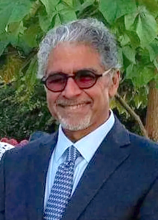The Department of Middle Eastern Languages and Cultures is thrilled to launch the Mo Habib Translation Prize in Persian Literature. This prize has been established in partnership with the Mo Habib Memorial Foundation and Deep Vellum Press to enable the publication and dissemination of Persian literary works that stand on their own in engaging English translation. It seeks to expand the readership of Persian literature in English, beyond academic audiences.
We anticipate that there will be multiple cycles. For its inaugural cycle, we welcome submissions in modern Persian fiction (novel and short story collection) from Afghanistan, Tajikistan, Iran, and their diaspora. The winning translation will receive a prize of $10,000 ($2,000 once the award is announced in July 2023, and $8,000 once the work is turned in by the deadline May 2024). This prize comes with a commitment by Deep Vellum to publish the translated work. Please submit the following materials in a single PDF file by March 1, 2023:
- A one-page cover letter that describes the work to be translated, and speaks to its larger import
- An up-to-date CV (no more than 3 pages)
- A bilingual sample of the proposed translation (no more than 20 pages, double spaced, in both languages - Meaning 20 pages in Persian and 20 pages in English)
- Proof of copyrights (if applicable)
The Mo Habib Memorial Foundation celebrates the life and legacy of Mohammad Habib by supporting education, culture, and the arts in the Pacific Northwest and beyond. Born in Tehran in 1952, he moved to the U.S. in 1970 to attend college, eventually obtaining his BS and MS in Engineering and Construction Management from the University of Washington. For forty years, he worked as a project manager and structural engineer. Mohammad is survived by his wife, Superior Court Judge Susan Amini, and his son, Cyrus Habib, who served as the state’s 16th Lieutenant Governor prior to leaving public life to become a Jesuit.
Founded in 2013 in Dallas, Texas, Deep Vellum's mission is to bring the world into conversation through literature. In its first five years, Deep Vellum published 90 works in translation by international writers (see here) and hosted dozens of literary events for Dallas residents.
FAQ
- Do I need to obtain a legal license for a book published in Iran?
Iran has not signed the 1886 Berne Copyright Convention that protects literary and artistic works by providing creators with the means to control how their works are used, by whom, and on what terms. And because there is no copyright treaty between Iran and the US (see, for example, the United States copyright law, 17 U.S.C. § 104), works by Iranian authors first published in Iran fall immediately into the public domain in the United States. Although not legally obligatory, it would be more ethical to obtain permission from the author. Unlike Iran, however, Afghanistan and Tajikistan are both signatories of the Copyright Convention, so unless the source text is in the public domain, a copyright permission would need to be obtained.
- I already have a contract with a different publisher, could I still apply?
No. The winning translation is to be published by Deep Vellum, so you may not have entered into a contract with a different publisher.
- My project will not be complete by May 2024, may I still apply?
We warmly encourage you to apply for a future cycle. Our projected timeline for this cycle is submission of the final manuscript by no later than May 2024.
All inquiries should be directed to Aria Fani (ariafani@uw.edu)
